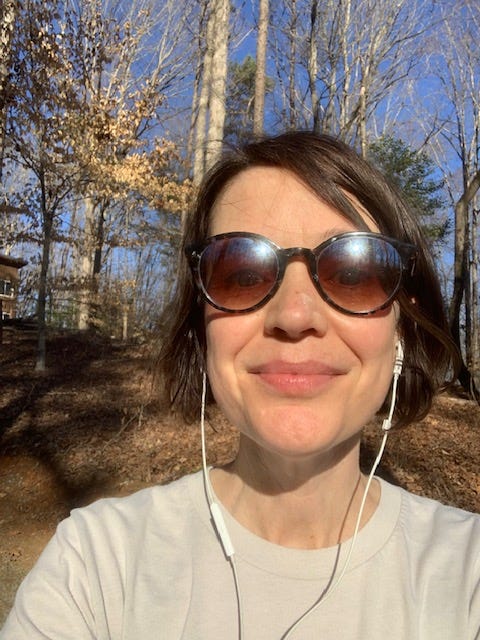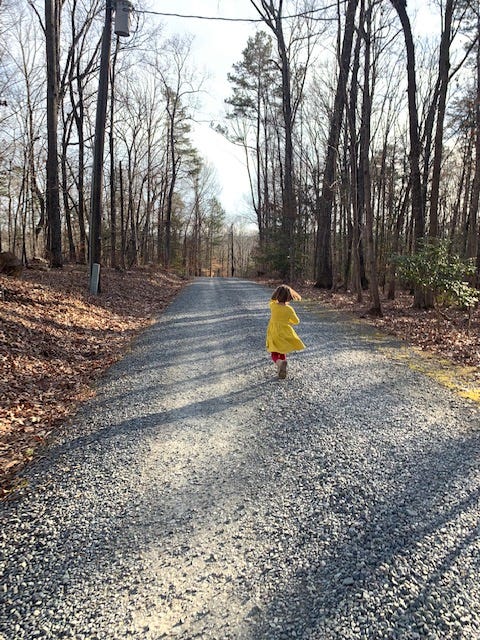One of the ways Bea and I differ is that she is naturally athletic—turning cartwheels with ease, kicking a soccer ball down the field, climbing rope swings alarmingly high—and I am not. Never have been. In fifth grade I was on a rec league soccer team and my foot never once touched the ball. The whole season!
Maybe it’s better to say that Bea is confident about what her mind and body can do together, and I tend to hesitate. I love to be outside, and I have a few athletic talents up my sleeve (I’m a good swimmer and kayaker, for example). But one thing I notice about the two of us is that I tend to get in my head (I can’t, that’s too hard, I’m no good at that), while Bea is excited and determined to try any sport, any new feat of strength or daring. She also worships her P.E. teacher, which let’s just say was not part of my school experience.
But lately, to my surprise, I’ve gotten into running. I downloaded the free version of the Nike Run Club app on my watch in December, starting with “easy run” and “easy run #2,” etc. I was skeptical at first that the guided runs would help (I’d rather listen to music or audiobooks or nature), but somehow the gentle coaching has helped me go from running just a mile to, the other day, almost four miles without stopping (well, I stopped once because I lost my place on the trail). I like trail running in our neighborhood, but I also do a little road running where there isn’t much traffic.
My favorite Run Club coaches are the ones who extol the virtues of recovery or easy runs, and who also talk about running for mental health. Andy Puddicombe, a former Buddhist monk and mindfulness teacher, has a lot of good runs about letting go of stress and running more mindfully. He often coaches with Chris Bennett, and together they talk about how running is always about “more than just the run.” It’s kind of corny, but Chris and Andy talk about ending the run just as just a little better version of the self that started the run (or something like that). And it’s true!
Back in December, I ran because I liked the way I felt after the run. Now my favorite part—and this really surprises me—is how I feel while I’m running: alert, alive, strong. And my favorite kind of day for running is a chilly or cold day, when I start by thinking, brrr, it’s really cold, this is kind of too much, better turn around. Before I even get to the river (another bonus is running toward and alongside the Haw) my body has warmed up enough that I feel comfortable in the chilly air. I feel like I could stay outside all day if I wanted, like my body belongs there.
*
Belonging is another thing I’ve been thinking and having conversations about, especially at work. What makes someone feel like they belong (or not), and whose responsibility is it to help someone feel at home in spaces that have historically excluded them? I work in a large academic department at a huge university, but my program is very small—currently just six faculty and 26 graduate students. Within my department, the MFA program (which I currently direct), is the most diverse of all the programs, with the largest proportion of new faculty.
My department is great in many ways—we have wonderful students, and the faculty like each other and get along well, especially for an English department. But the terrific new faculty are helping me to see more clearly that we’re pretty far from perfect. Despite their openness, I worry that we’re shying away from important conversations about belonging and responsibility.
And the more I think and talk with others about this, the more I realize that this is true in so many spaces. From a nephew’s preschool, where a teacher wants him to “stand up for himself” when another kid pushes him (literally!) to a friend’s daughter’s middle school, where a serious bullying issue wasn’t communicated to parents, to graduate student training that is making some students feel like they have to work twice as hard as other students.
When someone in a position of lower power experiences something unfair, and that unfairness seems to connect back to their race, their age, their gender, their sexuality—whose responsibility is it to listen, to consider the structures that have created that less-than-welcoming experience, and to work to make changes?
As Chris Bennett says (about runs, but more than runs), it’s so easy to make excuses. This meeting has gone on long enough. Or, maybe I’m not the right person to start this conversation. I don’t have the skills, the vocabulary, the time. It’s not my fault. Or—and this one always baffles me—the person who is experiencing an unfair or unwelcoming or threatening experience should be the one to initiate the conversation. These excuses, I’m realizing, are about protecting power and maintaining the status quo.
White people in places of relative power (like me) also often have privileges that we’re not even aware of. It’s easy to get defensive. It’s easy to make excuses. I find myself doing that sometimes, listing in my head the things I’ve already done, being defensive about my place in all of this.
But I want my colleagues and our students to love where they are. I want my kids to go to middle schools, high schools, and colleges that look better than they do today—fairer, more diverse, more welcoming. And that’s not going to happen without effort.
As with running, you don’t really need anything more than the willingness to start. And once you start, however you saw yourself before (not a runner! not an athlete!), you actually do belong in that conversation. Especially (and this is where the running metaphor ends) if you’re in a place of power.
So the tough conversations will continue. And so will the runs.
(I still can’t do a cartwheel. I think I’m too old to learn. And I don’t think that’s just negative self-talk.)
How about you? Have you started anything hard lately?
P.S. Did you know that Tiya Miles has a new Substack? Carrying Capacity, in her words, is “a place for story-loving people who know there is something wrong with our world but still insist on planting seeds for a better tomorrow. It is a cozy corner for romance readers and doom scrollers, for tree huggers and soothsayers, and for all who fret about the past and present state of things. It is a nook where we can together confront the strange duality of our times and bear the burden with more ease and even . . . joy.”







Share this post